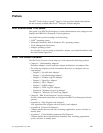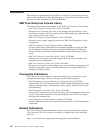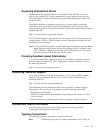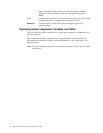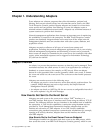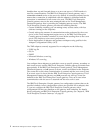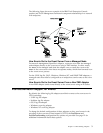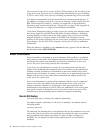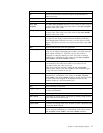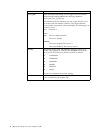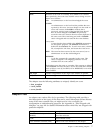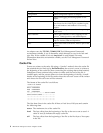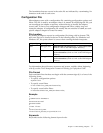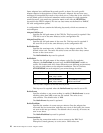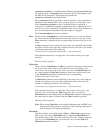
The event server can receive events in both UTF-8 encoding or the encoding of the
event server host. The event server automatically determines the type of encoding
(UTF-8 or non-UTF-8) of an event by evaluating a particular flag in the event data.
The adapter automatically reads the format file from the appropriate directory. If
the adapter is sending events to an event server running a version earlier than the
IBM Tivoli Enterprise Console 3.7 product, the format files in the localization
directories must remain in English. See “Format File” on page 17 and Appendix B,
“Format File Reference” on page 145 for additional information.
Tivoli Event Integration Facility provides support for creating new adapters (other
than those shipped by the IBM Tivoli Enterprise Console product) or modifying
existing adapters to send events to the latest version of the event server. Existing
adapters shipped in a previous release of the IBM Tivoli Enterprise Console
product do not require updating; the new event server recognizes events sent from
those adapters. See the Tivoli Event Integration Facility User’s Guide for additional
information.
When the adapter is installed, a new codesets directory appears with the bin and
etc directories under $TECADHOME.
Event Information
Event information is formatted as a set of attributes. Each attribute is predefined
and contains a name and value. Adapters separate information into event classes,
format this information into attributes, and send this information to the event
server. The event server then processes this information.
Event classes are a classification of events; do not confuse them with the term
classes in the traditional object-oriented sense. Event classes can be subclassed to
facilitate a further breakdown of information so that more detailed rules can be
applied to the information. In essence, event classes are an agreement between the
adapter and the event server about what information the adapter sends to the
event server for a given class.
After event information is separated into attributes and the event is categorized
into an event class, the adapter sends the information to the event server for
further processing. Adapters are configured to send only information that
administrators are interested in; that is, filters are established on the local system
that specify whether to discard an event or forward it to the event server. This
minimizes any network loading that is related to enterprise monitoring.
Event Attributes
An event class name is followed by attribute information.
An adapter supplies information in the form of attributes. An attribute has the
following format:
attribute_name=value
The following list describes base event attributes that can be contained in an event
sent to the event server. Base event attributes are standard for most event classes
and are defined in the highest superclass of a basic recorder of objects in C
(BAROC) file. An adapter can also contain adapter-specific or user-defined
attributes.
4 IBM Tivoli Enterprise Console: Adapters Guide




